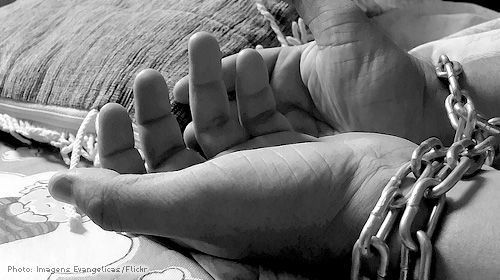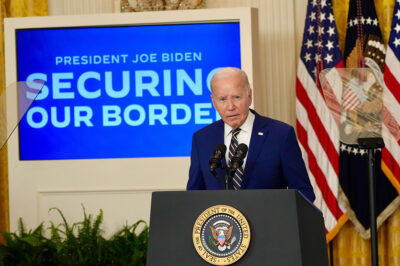
A White House task force set up to combat human trafficking held its annual meeting today, chaired by Secretary of State John Kerry. The cabinet-level group, called the President's Interagency Task Force to Monitor and Combat Trafficking in Persons (PITF) coordinates the U.S. government's efforts to eradicate the phenomenon commonly likened to "modern-day slavery."
At the meeting, Secretary Kerry stated he had been "stunned by the stories and examples of the evil... It is nothing less than the most predatory, extraordinary modern slavery that you can conceivably imagine."
The PITF was not the only human trafficking-related event this week.
On Monday and Tuesday, the United Nations convened a high-level General Assumbly meeting on the Global Plan of Action to Combat Trafficking in Persons. The Plan of Action commits governments around the world to fully implement key anti-human trafficking treaties and to join forces to counter the multi-billion dollar industry which has trapped some 21 million men, women and children in forced labor. At the meeting, actress Mira Sorvino, the United Nations Goodwill Ambassador to Combat Human Trafficking, described human trafficking as "one of the great social justice issues of our time." The United States also addressed the meeting, stating, "(t)he solution in face of this scourge is clear – joint action across nations and across UN agencies." United Nations Secretary-General Ban Ki-moon noted that "(h)uman trafficking devastates individuals and undermines national economies," and called on governments to prevent trafficking by ratifying relevant treaties, implementing the U.N.'s Global Plan of Action against trafficking, and making contributions to the United Nations Voluntary Trust Fund to help victims.
The ACLU endorses these measures and encourages the U.S. to do more to address human trafficking through better monitoring and enforcement of existing anti-trafficking laws, policies and practices.
For years, the ACLU has worked with other organizations to protect the human rights of victims of labor trafficking. That work has included:
- Advocating on behalf of 500 guestworkers from India who were trafficked into the U.S. through the federal government's H-2B guestworker program with dishonest assurances of becoming lawful permanent U.S. residents and subjected to squalid living conditions, fraudulent payment practices, and threats of serious harm. The workers' lawsuit, which was filed in 2008, highlights serious flaws in the current guestworker program wherein foreign low-wage temporary workers are subjected to numerous human rights violations including trafficking and forced labor. These violations take place due in part to the exploitation of visa application processes by duplicitous recruiters and employers. The lawsuit also highlights the U.S. government's failure to regulate and supervise these visa schemes appropriately to prevent abuse, and failure to vigorously enforce anti-trafficking and labor laws when violations occur.
- Advocating on behalf of foreign workers, known as Third Country Nationals (TCNs), contracted to perform services for the United States overseas, including in Iraq and Afghanistan. Many of these workers have been deceived about how much they will be paid, as well the nature and location of their job, and charged thousands of dollars in recruitment fees that effectively place them in debt bondage. Last year, President Obama issued an important Executive Order aimed at addressing these issues and in January this year Congress enacted legislation designed to achieve these same ends. These measures, while welcome, will only prove effective if they are properly implemented and enforced. Together with a coalition of anti-trafficking groups, the ACLU recently made recommendations to the Federal Acquisition and Regulatory (FAR) Council to ensure the laws effectiveness.
- Advocating on behalf of domestic workers trafficked into the United States by foreign diplomats stationed here and subjected to forced labor and other abuses. Because of diplomatic immunity, victims are left without access to legal remedies for these abuses. Domestic workers are a uniquely vulnerable population as they do not generally enjoy the right to organize, minimum wage protections, or other fundamental workplace protections, and their race, gender, immigration status, education levels, and physical isolation in the home make them particularly susceptible to labor trafficking.
Today's PITF meeting and Monday and Tuesday's UN meetings were important reminders that despite some progress, much more must be done by governments and civil society to combat human trafficking in this country and to provide redress and other support to victims.
In the words of Secretary General Ban Ki-moon, "(h)uman trafficking is a vicious chain that binds victims to criminals. We must break this chain with the force of human solidarity."
Learn more about human trafficking and other civil liberty issues: Sign up for breaking news alerts, follow us on Twitter, and like us on Facebook.





